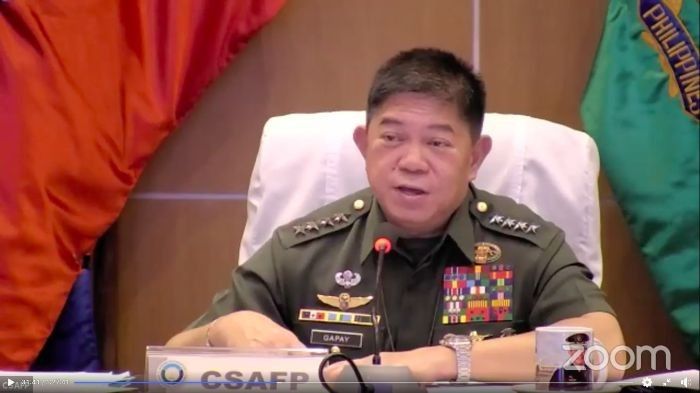AFP chief: Around P480 billion needed in next 18 years for modernization

MANILA, Philippines — The chief of the Armed Forces of the Philippines on Tuesday confirmed that the military's modernization program has suffered significant delays and needs funding worth P480 billion in the next 18 years to be executed.
This comes after Senators Ping Lacson and Franklin Drilon flagged the "snail-paced" implementation of the same program during a hearing on the Department of National Defense's budget for 2021 on Monday.
During an online news forum hosted by the Foreign Correspondents Association of the Philippines, Gen. Gilbert Gapay, AFP chief, identified three main factors which contributed to these delays:
- lack of funds
- flawed procurement process or the need for a defense procurement law
- the COVID-19 pandemic
"Right now, the [AFP] is facing several security challenges. We have internal threats from the CPP-NPA, from the local terrorist groups, and we have the West Philippine Sea, and we have to protect our maritime resources for the Filipino people and support the [national police] in their anti-criminality campaign. We really need these capabilities, and with these delays, of course...it impairs the accomplishment of our mission," Gapay said.
'Lack of funding'
Gapay emphasized that the program is delayed as far as its original time frame is concerned.
The original timeline, he explained, began in 1995 with the passing of RA 7898, or the AFP Modernization Act which sought to develop a "credible defense posture with modern equipment" by 2010. However, the army chief said that only P55 billion of the needed P330 billion was received by the AFP for this.
This time frame was updated by RA 10349, or the Revised AFP Modernization Act, in 2013. However, it seems that the military is still behind on implementing this timeline.
The AFP's modernization plan was meant to come to full fruition by 2028, Gapay said, to be implemented across three phases — also referred to as horizons.
According to the AFP chief, the military is currently on Horizon 2 and is "almost done" with Horizon 1.
"We're just awaiting the deliveries to complete the remaining, more or less, 20 projects, [for Horizon 1]," Gapay said.
Meanwhile, he said only two of the 94 projects for Horizon 2 have been completed while the rest are in various stages of procurement.
"We're also experiencing delays in the execution. The budget provided didn't match the planned capability buildup of the armed forces. That's why...we need around P480 billion for the next eighteen years," the AFP chief said.
Passage of defense procurement law urged
Gapay added that the lack of a defense procurement law poses a challenge to the implementation of the AFP's modernization program.
"Even our projects are being published in the PhilGEPS just like common supplies of the different government agencies. Imagine, these are supposed to be confidential and top secret capabilities which we're developing and we are not exempted from posting these things in our invitation to bid," he said.
On its website, the PhilGEPS is defined as a centralized electronic portal which serves as the "primary and definitive source of information on government procurement."
Gapay said there are proposals in both the Senate and the House of Representatives to have a separate defense procurement law to govern the AFP's modernization program.
"Since, we don't have that law, we're still governed by Republic Act 9184 or the Government Procurement [Reform] Act. So, its also one of the challenges we have that causes delay in the [implementation] of the projects," he said.
Pandemic-induced delays
The AFP chief further identified the redirecting of the military's modernization funds to the government's pandemic response as one of the factors causing the setbacks in the project's implementation.
"So, for this year alone, the government has regrouped some P17 billion of our modernization budget to be used for the [its] COVID-19 related activities," Gapay said.
The military is requesting a budget of P38 billion for 2021 to fund the same program.
"Usually, from the approval or awarding of the contract to the winning bidder, [it takes] two years... its that long, because some of the equipment has to be manufactured, especially the ships, the aircrafts, and also tanks and other weapon systems," Gapay emphasized.
"So, imagine if it will take us a year for the bidding and procurement process, and wait another two years for delivery, thats three years, and, you know, that's too much delay as far as capability buildup is concerned."
- Latest
- Trending

































